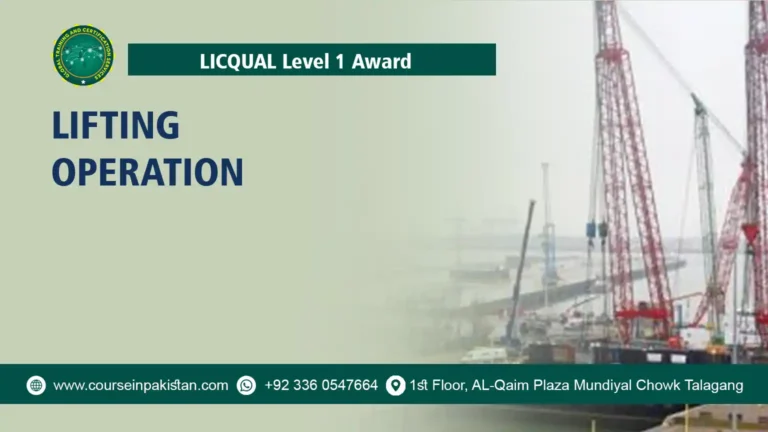
ICTQual Level 1 Award in Energy Management
In today’s era of environmental consciousness and sustainability, the Level 1 Award in Energy Management serves as a foundational course designed to introduce participants to the essential principles and practices of energy efficiency. This award equips individuals with fundamental knowledge and skills necessary to initiate and support energy management initiatives within various organizational contexts.
Course Introduction
The Level 1 Award in Energy Management provides participants with an introductory understanding of energy management principles and their applications in everyday settings. This course is ideal for beginners seeking to grasp the basics of energy efficiency, environmental responsibility, and the role of individuals in reducing energy consumption.
Course Overview
Participants in the Level 1 Award program will explore foundational topics essential for effective energy management:
- Fundamentals of Energy Efficiency: Introduction to energy sources, consumption patterns, and environmental impacts.
- Energy Awareness: Understanding the importance of energy conservation and its impact on organizational and environmental sustainability.
- Basic Energy Saving Techniques: Implementing simple strategies to reduce energy consumption in residential and workplace settings.
- Introduction to Energy Audits: Overview of basic energy auditing principles and their role in identifying energy-saving opportunities.
Course Benefits
- Basic Knowledge Acquisition: Gain a foundational understanding of energy management principles and practices.
- Environmental Impact: Contribute to sustainability goals by promoting energy-efficient behaviors and practices.
- Cost Savings: Implement basic energy-saving techniques to reduce operational costs and improve financial performance.
- Personal and Professional Development: Enhance skills and knowledge that are transferable across various industries and roles.
Course Study Units
- Fundamentals of energy management
- Energy consumption awareness in the workplace
- Reducing energy consumption in the workplace
- Importance of collecting and managing energy data
- Importance of energy audits and assessments in the workplace
- Legislative and regulatory requirements covering energy
- Importance of an organisation’s energy strategy, planning and policy
Learning Outcomes
Fundamentals of Energy Management
- Learning Outcomes:
- Understand the basic principles and concepts of energy management.
- Recognize the significance of energy efficiency and its impact on organizational sustainability.
- Identify key stakeholders and their roles in implementing energy management practices within organizations.
Energy Consumption Awareness in the Workplace
- Learning Outcomes:
- Increase awareness among employees about energy consumption and its environmental and financial implications.
- Promote behavioral changes and practices that contribute to energy conservation in the workplace.
- Foster a culture of responsibility and proactive energy management among staff members.
Reducing Energy Consumption in the Workplace
- Learning Outcomes:
- Implement strategies and initiatives to reduce energy consumption within workplace environments.
- Identify and prioritize areas for energy efficiency improvements based on consumption data and audit findings.
- Monitor and evaluate the effectiveness of energy reduction measures to achieve sustainability goals.
Importance of Collecting and Managing Energy Data
- Learning Outcomes:
- Understand the importance of collecting accurate and reliable energy data for effective energy management.
- Implement systems and procedures to collect, analyze, and interpret energy data.
- Use energy data to identify trends, anomalies, and opportunities for efficiency improvements.
Importance of Energy Audits and Assessments in the Workplace
- Learning Outcomes:
- Conduct comprehensive energy audits and assessments to evaluate current energy performance and identify inefficiencies.
- Recommend and implement energy-saving measures and improvements based on audit findings.
- Monitor and measure the impact of energy efficiency initiatives to ensure continuous improvement.
Legislative and Regulatory Requirements Covering Energy
- Learning Outcomes:
- Understand legislative and regulatory frameworks governing energy management, efficiency, and conservation.
- Ensure compliance with applicable energy-related laws, regulations, and standards.
- Implement measures and practices to mitigate risks associated with non-compliance and ensure organizational adherence to legal requirements.
Importance of an Organisation’s Energy Strategy, Planning and Policy
- Learning Outcomes:
- Develop and implement effective energy strategies aligned with organizational goals and objectives.
- Plan and prioritize energy management initiatives based on strategic planning and policy frameworks.
- Establish energy policies and guidelines to guide organizational practices and decision-making processes.
These learning outcomes are designed to equip individuals with the knowledge and skills necessary to effectively manage energy resources, implement sustainable practices, comply with regulations, and achieve operational efficiency within organizational settings.
Who Is This Course For?
The Level 1 Award in Energy Management is suitable for:
- Students and Entry-Level Professionals: Interested in gaining foundational knowledge in energy management and sustainability.
- Homeowners and Residents: Looking to reduce energy bills and minimize their environmental footprint.
- Small Business Owners: Seeking to implement cost-effective energy-saving measures within their operations.
- Environmental Enthusiasts: Eager to contribute to global sustainability efforts through personal and professional actions.
Future Progression for This Course
Graduates of the Level 1 Award can progress in various ways, including:
- Advanced Certifications: Pursue higher-level certifications in energy management or sustainability, such as the Level 2 Award or Certified Energy Manager (CEM).
- Specialized Training: Attend workshops or courses focusing on specific aspects of energy efficiency, renewable energy, or environmental management.
- Career Development: Apply foundational knowledge and skills to advance in roles related to energy management, sustainability consulting, or environmental advocacy.
- Further Education: Pursue higher education in fields such as Environmental Science, Renewable Energy, or Sustainable Development.
The Level 1 Award in Energy Management offers a solid introduction to the principles and practices of energy efficiency, empowering individuals to make informed decisions that benefit both their organizations and the environment. By starting with this foundational course, participants lay the groundwork for ongoing learning and professional growth in the dynamic field of energy management. Embrace the opportunity to begin your journey towards a more sustainable future with the Level 1 Award in Energy Management.





